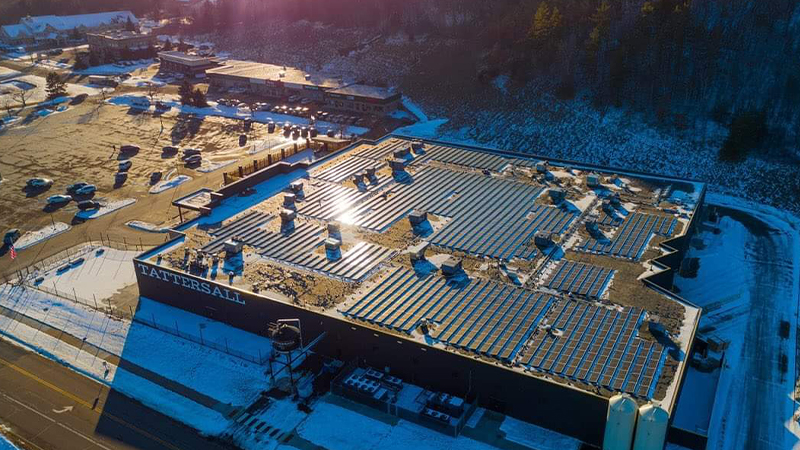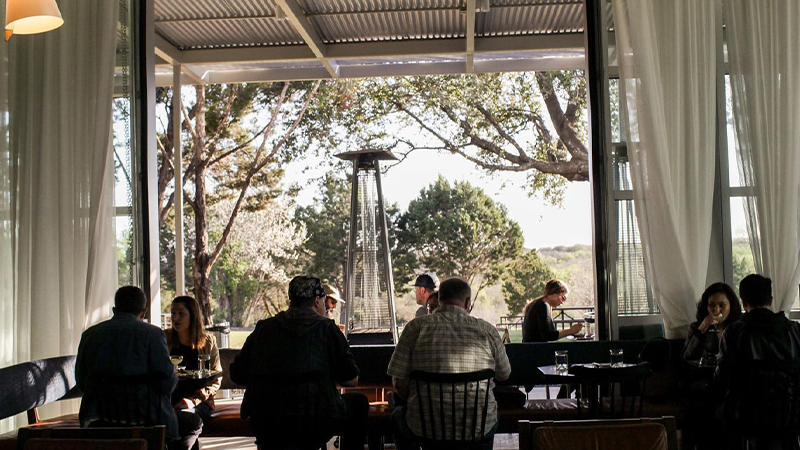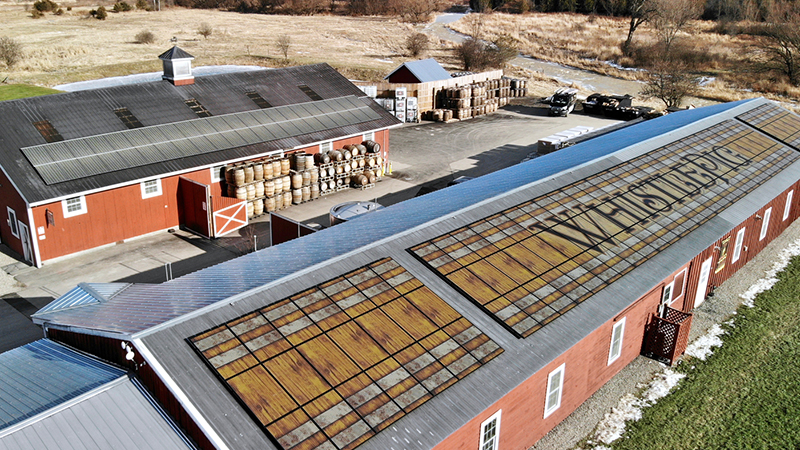In November 2021, Tattersall Distilling opened a new distillery and event space in River Falls, Wis., some 30 minutes east of its original Minneapolis location. The tasting room, restaurant, and outdoor amphitheater contained within the 75,000-square-foot space are visually impressive and practically impossible to miss.
Yet it could be argued that the facility’s most noteworthy feature is something that is not as easily seen. The property boasts a massive 405 kilowatt solar array on its rooftop, making it the largest solar array of any distillery in the country. “We didn’t realize that it was the largest until after it was up,” explains Jon Kriedler, Tattersall’s founder and chief officer. “It really surprised us when we found that out. But we have a flat, 80-square-foot roof; it was just a no-brainer for us to install a solar array up there.”
Statistically speaking, Tattersall’s panels are poised to produce eco-friendly premiums. The projected annual electricity generated by the array offsets 373 tons of carbon dioxide — the same amount stored by 415 acres of forest. At the same time, the array organically shines a spotlight on a process that, in some ways, can act as the toe dip that compels a distillery to fully immerse itself into sustainability.
Don’t miss a drop!
Get the latest in beer, wine, and cocktail culture sent straight to your inbox.
Solar and Sustainability
Solar paneling’s core function of converting absorbed and stored sunlight into energy isn’t as mysterious as it’s been in the past. Today, questions of how the panels can work when the skies are gray in the wintertime can be readily answered with a quick Google search. This increased awareness of how solar panels function can pay dividends in the distilling industry, as such knowledge provides more than power; it builds a foundation that can change how distilleries operate.

It’s a change that’s increasingly vital in this era of climate change and planet protection. Distilleries devour copious amounts of energy. A research paper on whiskey production presented last July at the 19th International Conference on Renewable Energies and Power Quality in Almeria, Spain, concluded that distilleries were responsible for roughly 10 percent of Scotland’s total energy consumption. Fortunately, all it takes is one initial whittle of sustainable practice to start carving away at such usage. Distilleries that have embraced solar power see it as a gateway practice that has since led them down a more robust sustainable pathway. “Solar power is the easiest way for a distillery to improve energy efficiency,” explains Tim Penney, managing partner of Fierce Whiskers Distillery in Austin, Texas. “Once you get on board with solar, you start trying to figure out how to make everything sustainable.”
In Fierce Whiskers’ case, this mission currently stands as its defining element. The distillery, which launched last September, isn’t selling its first bottled spirits until next year, when its rye will be ready for market. This invariably draws greater attention to its use of solar power, a practice that allows the brand to detach from Texas’s temperamental power grid during peak times. It also creates a stronger emphasis on some more ambitious sustainability projects, such as using data analysis to track energy and emission intensity and utilizing a sophisticated louver system in its five-story rickhouse to mitigate the Texas heat without using an energy-sucking HVAC system. “We don’t have consumers yet, but we want to set the bar high right off the bat,” Penney says. “We may not be the biggest distiller, but we want to be sustainability leaders that can help others get involved.”

Likewise, the conversations sparked by the size of Tattersall’s solar array have led to discussions about the other components of the brand’s sustainability mission, such as its in-house reclaimed water system and its practice of sending surplus spent grain to local cattle farmers, who in turn feed the livestock that eventually lands on the distillery’s in-house restaurant menu. “The more you go down the sustainability rabbit hole, the more you realize you can do more,” explains Kreidler. “Solar power is just one piece of the sustainability puzzle.”
It’s not just new facilities or brand-new products driving the solar panel game. In 2020, WhistlePig added a solar array to its rural farmhouse-turned-distillery in Shoreham, Vt. This inclusion turned out to be an opening salvo for a three-year collaborative effort with clean energy project firm Carbon Better, whose president, Tri Vo, is also one of Fierce Whiskers’ co-founders. The ambitious project will lead to the famed rye producer being 100 percent solar powered by spring of 2023. “It’s super important for us to be stewards of the land. We couldn’t do what we do if we weren’t,” says WhistlePig’s director of operations and R&D, Liz Rhodes. “Moving toward 100 percent solar power as part of our sustainability strategy gives us another way to be those stewards, as well as another way to honor our rye.”
A Brighter Future
While implementing solar panels can provide an easy way for distilleries to enter the sustainability game, the process isn’t without its hiccups. Bureaucracy tends to be the squeaky wheel. “The biggest issue we’ve had with our solar panels was getting the permits,” Penney explains. “We had our panels ready to go for months, but we couldn’t activate them because of paperwork. It was frustrating.” At the same time, these issues aren’t as crippling when they’re viewed in the context of the greater mission. “The glitches we’ve experienced along our journey with solar aren’t as different as some of the glitches we’ve experienced with other forms of sustainability,” Rhodes says. “It’s just part of the process.”

It’s a process that seems more important for distilleries to partake in with each passing year, as the need to do something positive and healing on behalf of the planet becomes more crucial. “Sustainability is no longer a luxury in the industry,” Penney says. “It’s a necessity.”
This story is a part of VP Pro, our free content platform and newsletter for the drinks industry, covering wine, beer, and liquor — and beyond. Sign up for VP Pro now!


